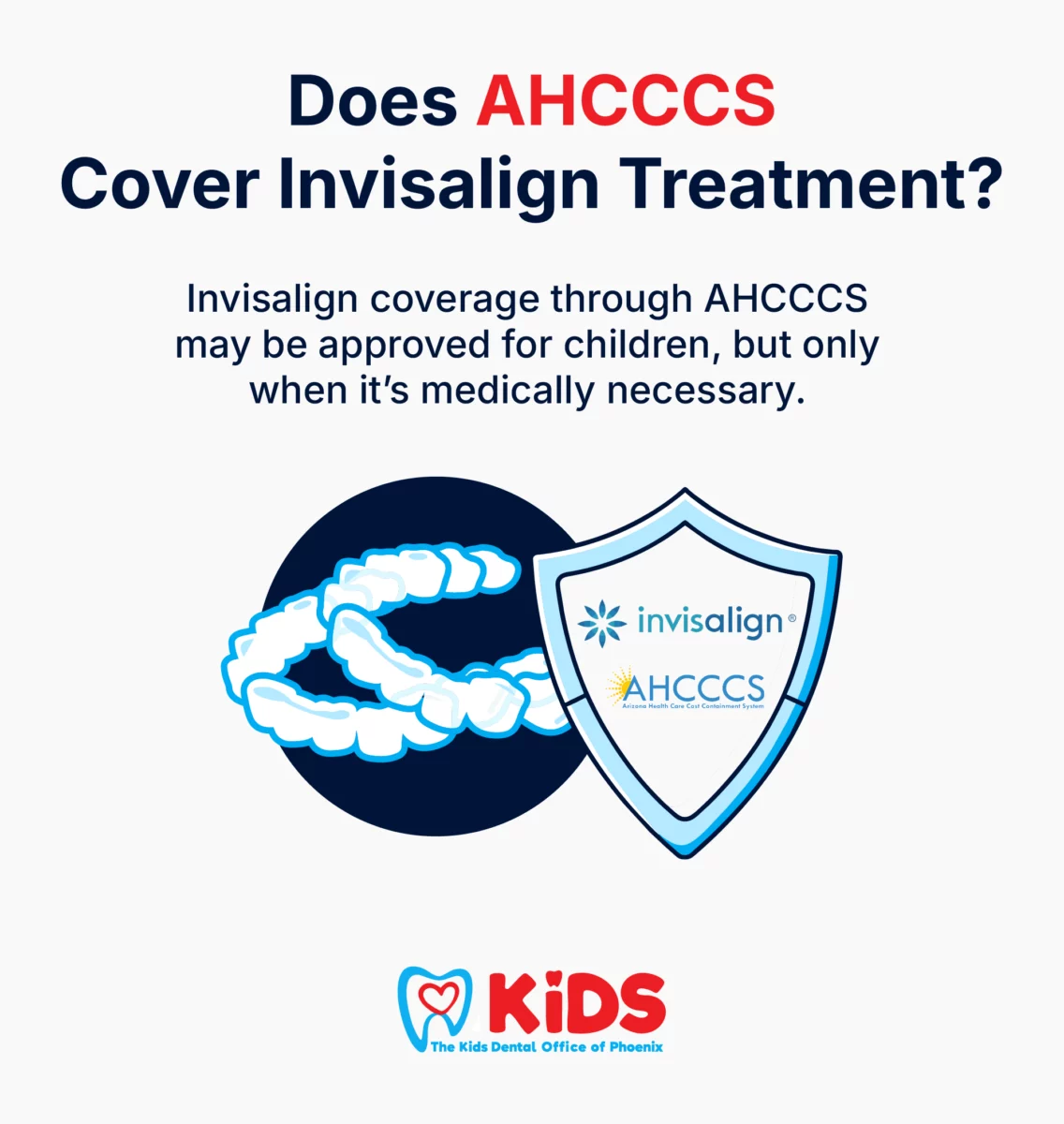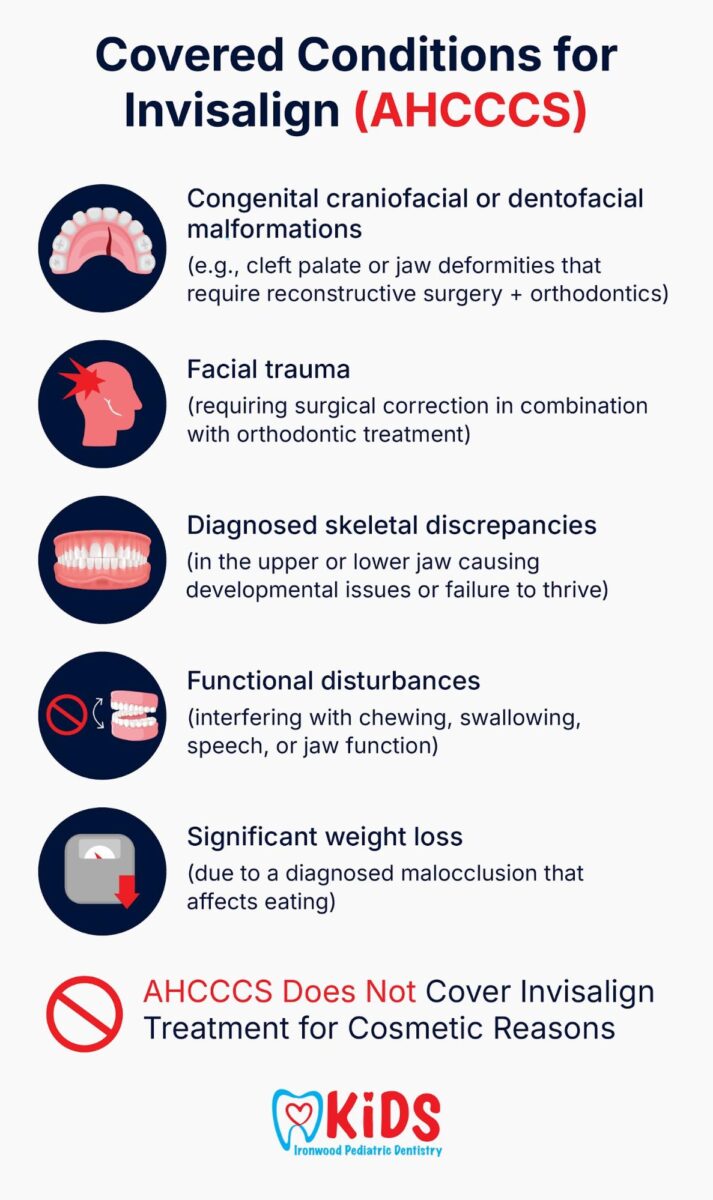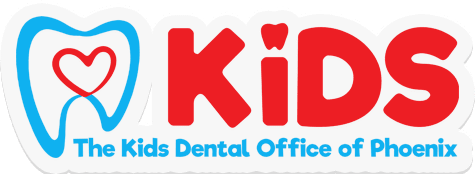The Arizona Health Care Cost Containment System (AHCCCS) can cover Invisalign for children under 19 if it is medically necessary; however, Invisalign is usually considered cosmetic.
At The Kids Dental Office of Phoenix, we accept AHCCCS for orthodontic treatments!Please call us at (602) 903-4894 to schedule an appointment so we can find out the best option for your child.

What About Invisalign Treatment Under AHCCCS?
Whether AHCCCS will cover Invisalign clear plastic aligner orthodontic treatment depends on whether Invisalign is considered to be “medically necessary” under federal Medicaid rules.
AHCCCS will not cover the following kinds of medical and dental services:
- Any care, treatment, or surgery that is not medically necessary
- Services or items for cosmetic reasons (A.A.C. R9-22-215C.3)
As a general rule, Invisalign is not considered medically necessary in most cases.
Instead, Medicaid will ordinarily classify it as “cosmetic” and not cover it under AHCCCS.

Under AHCCCS, a medically necessary service is one that a licensed health care professional provides to do either or both of the following:
- Prevent death, or to cure or treat a disease, or to ameliorate a disability or other adverse health condition.
- Prolong life.
For orthodontics in particular, AHCCCS considers the following conditions to warrant medically necessary treatment:
- Congenital craniofacial or dentofacial malformations requiring reconstructive surgical correction in addition to orthodontic services; or
- Trauma requiring surgical treatment in addition to orthodontic services; or
- Diagnosed Skeletal discrepancy involving maxillary and/or mandibular structures that result in failure to thrive; or
- Diagnosed functional disturbance that interferes with mastication, swallowing, speech, and normal function of the jaw; or
- Diagnosed significant weight loss due to an existing malocclusion.
Both your child’s primary care provider and dental provider must agree that one of the above conditions exists for AHCCCS to cover orthodontics.
Of these factors, #4 is the best candidate to justify Invisalign treatment.
So, at the beginning of our consideration, it is arguable that Invisalign treatment can be considered “medically necessary” because it can ameliorate an adverse health condition.
For example, tooth misalignment can interfere with chewing, swallowing, speech, or normal jaw function.
But the inquiry does not stop there.
We next need to consider whether AHCCCS considers a treatment like Invisalign to be more “cosmetic” than “medically necessary.”
What Makes an Orthodontic Procedure Cosmetic in Nature?
Cosmetic dentistry is focused on improving your smile. Cosmetic dentistry, therefore, concentrates mainly on:
- Keeping teeth straight
- Whitening teeth
Invisalign aligners are an excellent choice for children with mild-to-moderate tooth misalignment problems.
They are less effective in treating major orthodontic issues like jaw misalignment or serious malocclusion problems.
Metal braces are more effective and usually less expensive for more significant orthodontic needs.
Orthodontics, by comparison, focuses more on the five kinds of conditions listed above.
While orthodontics can certainly result in a better-looking smile, that purpose is secondary to fixing significant oral health problems that affect your child’s overall health.
When Does Invisalign Treatment Become Cosmetic for AHCCCS Purposes?
Your primary care physician and orthodontist must agree that orthodontic treatment is needed before AHCCCS pays for it.
The central question that must be answered here is, “What is the main goal of the Invisalign treatment?”
- If the main goal of Invisalign treatment is cosmetic—straightening teeth for a better smile—then this is likely to be considered a cosmetic purpose. AHCCCS will not pay for it in this case.
- If the main goal of Invisalign treatment is to treat a functional oral health issue, like chewing, swallowing, or speaking, then it may be considered orthodontic and not cosmetic.
There is no single answer to this question.
Each case must be decided based on the professional opinions of the primary care provider and your orthodontist.
One additional consideration that AHCCCS will consider when deciding whether to pay for Invisalign treatment is cost.
If Invisalign treatment costs more than braces to achieve the same orthodontic treatment result, then AHCCCS policy will likely favor braces over Invisalign.
Call The Kids Dental Office of Phoenix to See if AHCCCS Will Pay for Invisalign Treatment
At The Kids Dental Office of Phoenix, our experienced pediatric dentists and orthodontists can tell you if Invisalign treatment is an option for your child when your household qualifies for AHCCCS-based insurance coverage.
Remember, not all orthodontic problems are suitable for Invisalign. If this is the case, we will tell you.
If Invisalign is an orthodontic option compared to braces, especially traditional metal braces, we will help you compare the costs.To learn more about Invisalign and AHCCCS coverage, call our office at (602) 903-4894 to speak with one of our orthodontists.
